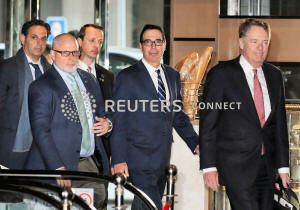|
Exclusive: China makes unprecedented
proposals on tech, trade talks progress - U.S. officials
 Send a link to a friend
Send a link to a friend
 [March 28, 2019]
By Jeff Mason [March 28, 2019]
By Jeff Mason
WASHINGTON (Reuters) - China has made
unprecedented proposals in talks with the United States on a range of
issues including forced technology transfer as the two sides work to
overcome remaining obstacles to a deal to end their protracted trade
war, U.S. officials told Reuters on Wednesday.
U.S. President Donald Trump imposed tariffs on $250 billion of Chinese
imports last year in a move to force China to change the way it does
business with the rest of the world and to pry open more of China's
economy to U.S. companies.
Among Trump's demands are for Beijing to end practices that Washington
alleges result in the systematic theft of U.S. intellectual property and
the forced transfer of American technology to Chinese companies.
China put proposals on the table in the talks that went further than in
the past, including on technology transfer, said one of four senior U.S.
administration officials who spoke to Reuters.

Negotiators have made progress on the details of the written agreements
that have been hashed out to address U.S. concerns, he said.
"If you looked at the texts a month ago compared to today, we have moved
forward in all areas. We aren't yet where we want to be," the official
said, speaking on condition of anonymity.
"They're talking about forced technology transfer in a way that they've
never wanted to talk about before - both in terms of scope and
specifics," he said, referring to Chinese negotiators. He declined to
give further detail.
Reuters reported previously that the two sides were working on written
agreements in six areas: forced technology transfer and cyber theft,
intellectual property rights, services, currency, agriculture and
non-tariff barriers to trade.
U.S. Trade Representative Robert Lighthizer and Treasury Secretary
Steven Mnuchin arrive in Beijing on Thursday for a new round of talks
with Chinese officials to work on a deal that would end a months-long
trade war that has cost both sides billions of dollars and hurt global
economic growth.
The in-person talks, which will be followed by a round in Washington
next week, are the first face-to-face meetings the two sides have held
in weeks after missing an initial end-of-March goal for a summit between
U.S. President Donald Trump and Chinese President Xi Jinping to sign a
pact.
Talks would continue as long as progress is being made on the core
issues, the official said.

"It could go to May, June, no one knows. It could happen in April, we
don't know," another administration official said.
The two sides still have differences over intellectual property and how
to enforce a deal, he said.
'SOME TARIFFS WILL STAY'
China wants the United States to lift its tariffs as part of a deal.
Washington, which is cognizant that the tariffs give it leverage to
ensure Beijing follows through on any commitments it makes, is wary of
lifting them right away.
[to top of second column]
|

Members of the U.S. trade delegation Robert Lighthizer and Steven
Mnuchin arrive at a hotel in Beijing, China March 28, 2019.
REUTERS/Jason Lee

Trump said last week the United States may leave tariffs on Chinese
goods for a "substantial period" to ensure compliance.
"Some tariffs will stay," the second official said. "There's going
to be some give on that, but we're not going to get rid of all the
tariffs. We can't."
The topic will be addressed in upcoming talks.
"Obviously that is an issue that we need to resolve ... and will be
an important part of a final deal," the first official said. He said
there was some agreement on enforcement on what he termed the
"backend" once a deal was in place: a structure in which both sides
could raise grievances and implement tariffs if there were
violations to the agreement.
Since July 2018, the United States has imposed duties on $250
billion worth of Chinese imports, including $50 billion in
technology and industrial goods at 25 percent and $200 billion in
other products including furniture and construction materials, at 10
percent.
China has hit back with tariffs on about $110 billion worth of U.S.
goods, including soybeans and other commodities.
The first official said the focus of talks had shifted from Chinese
purchases of U.S. goods to the trickier structural issues, which he
said Trump wanted as part of a "great" deal.

Bipartisan support at home for his tough stance on China as well as
from the business community have emboldened Trump as he pushes for a
deal that addresses long-standing complaints on trade, the source
said.
Some officials have expressed concern that Trump would accept a deal
involving big-ticket Chinese purchases of U.S. goods and falling
short on structural issues.
"Who would he be pleasing by .. selling out?" the source said.
He expressed optimism that a deal would be reached.
"I'm still confident, but it takes time," he said.
"Until any deal is finalized, it can always go either way. And the
president has made clear, both in word and in action, that he's
going to walk away from deals if they're not good deals."
(Reporting by Jeff Mason; Editing by Peter Cooney, Simon Webb & Shri
Navaratnam)
[© 2019 Thomson Reuters. All rights
reserved.]
Copyright 2019 Reuters. All rights reserved. This material may not be published,
broadcast, rewritten or redistributed.
Thompson Reuters is solely responsible for this content. |